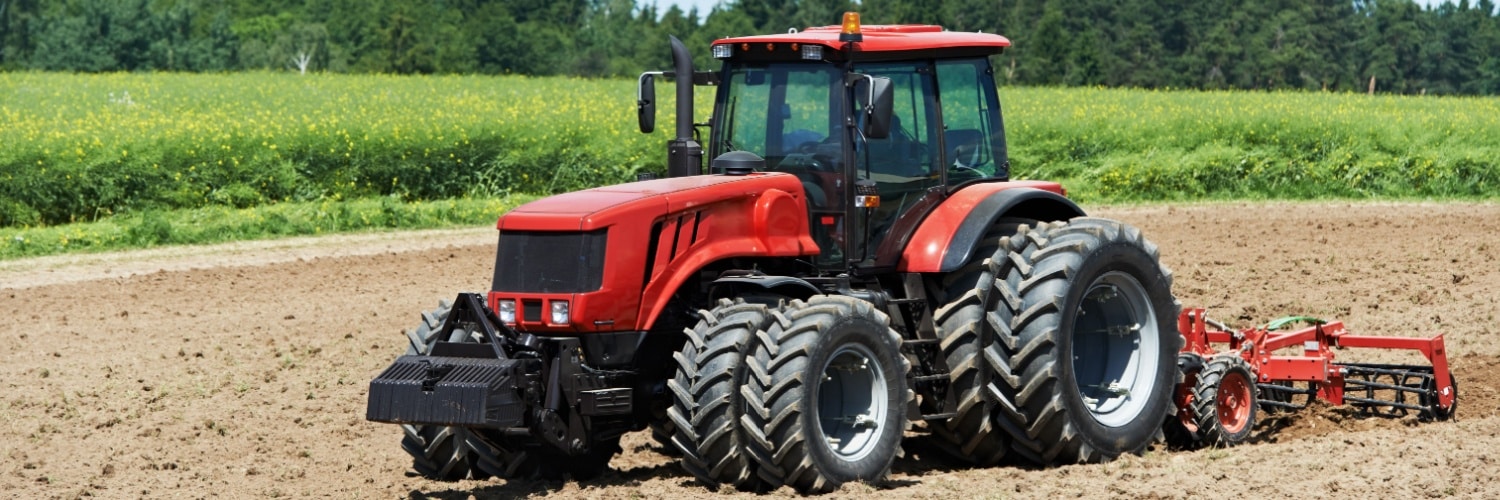Setting the right air pressure in your tractor tires is key to your tractor’s health and efficiency. Each tractor tire needs just the right amount of air to perform its best, especially when it comes to farm tires. This isn’t just about avoiding flat tires; it’s about making sure your tractor can do its job properly, whether that’s plowing fields or carrying loads.
Understanding the Basics of Tractor Tire Air Pressure
Air pressure in tractor tires is all about how much air is inside them. It’s a fine balance:
Over Inflation: The tractor can be hard to control, and the tires might wear out unevenly.
Under Inflation: The tires can get damaged easily, and the tractor might use more fuel than it should.
Getting the pressure right is crucial. It’s different for every tractor and job. For example, the pressure recommended for a light-duty task might be different than for heavy-duty work. Understanding this balance is the first step in maintaining your tractor’s tires. It’s not just about filling them up and hoping for the best; it’s about knowing what pressure works best for your tractor’s make and model, as well as the type of work you’re doing.
Factors Influencing Recommended Tire Pressure
Several things play into finding the perfect air pressure for your tractor tires:
Tire Size: Bigger tires usually need different air pressure than smaller ones.
Tractor Weight: How heavy your tractor is, including any load it’s carrying, affects how much air you need in your tires.
Type of Job: The kind of work you’re doing matters. If you’re weighing the rear axle with a heavy load, you’ll need more air in those tires.
Soil Type: If you’re working on soft soil, lower air pressure can help to avoid soil compaction.
Weather and Temperature: Changes in weather and temperature can cause air pressure in the tires to go up or down.
Tire Type: Different types of tires, like radial tires, may have specific air pressure needs. For example, radial tires might need around 35 psi, but this can vary.
Challenges in Maintaining Adequate Tire Air Pressure
Maintaining the right air pressure in tractor tires comes with its set of challenges, which can impact your farm’s productivity and efficiency:
Regular Monitoring: Tractor tires need frequent checking to ensure they’re at the correct pressure. This can be time-consuming, especially during peak farming seasons.
Varying Requirements: Different farming tasks require different tire pressures. For example, a task that involves weighing the rear axle with a heavy load will need a different pressure than a task that does not.
Environmental Effects: Changes in weather and temperature can affect air pressure in tires. A hot day can increase the pressure, while a cold morning might decrease it, requiring adjustments to maintain the optimal pressure.
Multiple Tractors and Tire Types: Farms often use various types of tractors and tires, each with its specific pressure requirements. Keeping track of the correct pressure for each can be complicated.
TreadRight’s Central Tire Inflation System, The Optimal Solution
TreadRight offers an innovative solution to these challenges with their Central Tire Inflation System (CTIS):
Automatic Pressure Adjustments: CTIS automatically adjusts the tire pressure based on the current load and terrain. This means the tires are always at the ideal pressure for every task, without the need for manual checking and adjusting.
Easy Monitoring and Control: The system is equipped with a user-friendly interface that allows farmers to easily monitor and control the air pressure in their tractor tires.
Adaptable to Various Conditions: Whether you’re working on soft soil and need to reduce the pressure to prevent soil compaction or you need higher pressures for road travel, the CTIS adapts to your needs.
Suitable for All Tractor Types: CTIS can be installed on a wide range of tractor models and is compatible with different tire types, including radial tires.
Efficiency and Time-Saving: By automating the pressure adjustment process, CTIS saves time and increases efficiency. Farmers can focus more on their work rather than worrying about tire pressures.
Long-Term Tire Health: Maintaining optimal tire pressure extends the life of your tractor tires, reduces the need for frequent replacements, and maintains fuel efficiency.
TreadRight’s CTIS tackles the challenges of maintaining adequate tire air pressure head-on, offering a sophisticated yet user-friendly system that ensures tractors operate efficiently under varying conditions.
Adjusting Air Pressure for Different Tasks
Different farming jobs need different tire pressures. For instance, if you’re pulling a plow, you might need a different pressure than when you’re just driving on a road. With TreadRight’s system, you can change the tire pressure easily. This helps your tractor do each job the best it can.
The Impact of Incorrect Air Pressure Management
Not managing your tire pressure right can lead to big problems. If the pressure is too low or too high, it can wear out your tires faster. Also, the wrong pressure can make your tractor use more fuel and can cause soil compaction. For radial tires, the right inflation pressures are around 35 psi, but this can vary based on your tractor and what it’s doing.
Choose TreadRight for Your Tractor Tire Air Pressure Needs
If you’re in Canada, contact TreadRight for all your tractor tire pressure needs. We understand everything about farm tire pressure and can help you keep your tires at the best pressure for every job. With TreadRight’s help, you can make sure your tractor is always running smoothly and efficiently.
